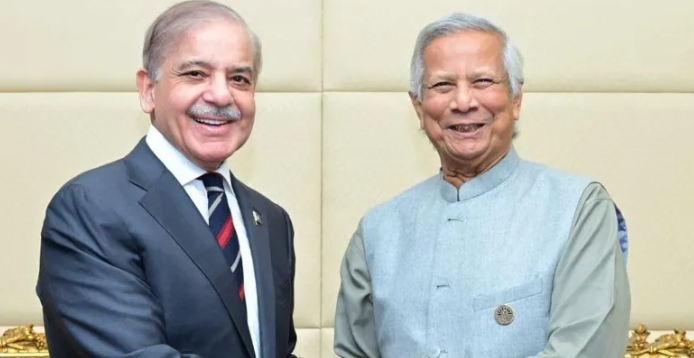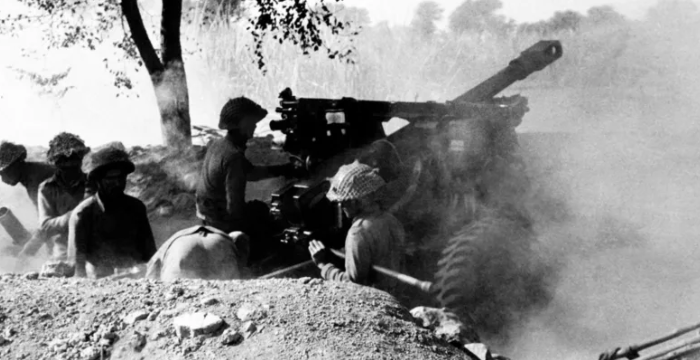The dramatic political developments in Bangladesh that led to the ousting of Prime Minister Sheikh Hasina last year have brought about several unexpected changes. Among the most significant is the growing closeness between Bangladesh and Pakistan, two nations with a long and complex history of conflict and uneasy diplomacy.
A Surprising Diplomatic Shift
After decades of troubled relations, Bangladesh and Pakistan have recently taken major steps to strengthen their ties. The two nations began direct trade last month, with Bangladesh importing 50,000 tonnes of rice from Pakistan. Other key developments include the revival of direct flights, enhanced military communication, simplified visa procedures, and growing cooperation on security matters.

This shift comes after years of strained relations, largely due to the historical animosity stemming from Bangladesh’s struggle for independence from Pakistan in 1971. However, under the current interim government in Bangladesh, led by Muhammad Yunus, relations appear to be normalizing, prompting keen interest from regional and global observers.
A Historical Perspective
The separation of Bangladesh (formerly East Pakistan) from Pakistan was one of the most traumatic events in South Asian history. India played a crucial role in supporting Bangladesh’s independence movement, which culminated in the 1971 war. As a result, Bangladesh has historically maintained closer ties with India than with Pakistan.
However, there have been periods of diplomatic warmth between Dhaka and Islamabad. Between 2001 and 2006, when the Bangladesh Nationalist Party (BNP) and Jamaat-e-Islami ruled, relations with Pakistan improved. However, Hasina’s tenure from 2009 onwards saw a shift towards stronger ties with India, keeping Pakistan at a distance.
Her sudden ousting and exile to India, amid mass protests, have now led to a reconfiguration of Bangladesh’s foreign policy, raising questions about the long-term implications for the region.
Strategic Motivations Behind the Shift
Many experts believe that the renewed ties between Bangladesh and Pakistan are driven by strategic calculations.
“For the past 15 years, the Pakistan-Bangladesh relationship was on a slightly difficult trajectory,” says Humayun Kabir, a former Bangladeshi diplomat. “Now, both countries seem to be returning to a more neutral relationship as normal neighbors.”
Some analysts suggest that Bangladesh and Pakistan are joining forces to counterbalance India’s influence in South Asia. Ayesha Siddiqa, a Pakistani academic at King’s College London, argues that the diplomatic shift represents “a tactical move against India’s regional dominance.”
The Role of Military Relations
One of the most notable aspects of the rekindled relationship is military cooperation. In January, a high-level Bangladeshi military delegation visited Pakistan and met with the influential army chief, General Asim Munir. Bangladesh also participated in Pakistan’s multinational maritime exercise off the Karachi coast in February.

These developments have raised concerns in India, which has a history of strained relations with Pakistan. Veena Sikri, India’s former High Commissioner to Bangladesh, sees these ties as a “déjà vu moment,” recalling allegations that Pakistan’s intelligence agency, ISI, supported Indian insurgents inside Bangladesh in the early 2000s.
While both Bangladesh and Pakistan have denied such allegations, the possibility of deeper security cooperation between the two nations remains a sensitive issue for India.
Economic and Trade Prospects
Despite political tensions, economic cooperation between Bangladesh and Pakistan has significant potential. Current trade volumes remain relatively low, at under $700 million annually, mostly in favor of Pakistan. However, economic experts argue that there is room for expansion.
“Pakistan, with its population of over 250 million, represents a strong market for Bangladesh,” says Sabrin Beg, an associate professor of economics at the University of Delaware. However, she notes that trade barriers such as high tariffs and visa restrictions need to be addressed before significant progress can be made.
The upcoming visit of Pakistani Foreign Minister Ishaq Dar to Dhaka in April is expected to lay the groundwork for stronger economic ties. Moreover, the outcome of Bangladesh’s general elections later this year may further shape the country’s foreign policy trajectory.
The 1971 War and the Need for Reconciliation
While Bangladesh and Pakistan explore closer ties, unresolved historical issues still loom large. Bangladesh has long demanded a formal apology from Pakistan for the atrocities committed by its military during the 1971 war, in which hundreds of thousands of Bengalis were killed and thousands of women were raped.
So far, Pakistan has shown little inclination to issue such an apology. Even Pakistani military figures acknowledge the sensitivity of the issue. “The main stumbling block in bilateral ties is the requirement that Pakistan apologizes for what happened in 1971,” says Ikram Sehgal, a retired Pakistani army major.
However, Sehgal also highlights violence against the Urdu-speaking Bihari community in East Pakistan (now Bangladesh) during the war, arguing that these historical wounds need a balanced discussion.
Regional Implications and India’s Concerns
India is closely monitoring the evolving Bangladesh-Pakistan relationship. Given its geographical and economic ties with Bangladesh, India has historically played a significant role in its neighbor’s affairs. However, relations have turned frosty since Hasina’s departure, with India refusing to extradite her despite Bangladesh’s accusations of corruption and crimes against humanity. Hasina has denied all charges against her.
From India’s perspective, a stronger Pakistan-Bangladesh relationship could present security challenges, especially given past concerns over insurgent activities along the India-Bangladesh border. New Delhi will likely continue to engage with Dhaka to ensure that its strategic interests in the region are protected.
Conclusion
Bangladesh’s evolving foreign policy presents both opportunities and challenges. While closer ties with Pakistan may offer economic and security benefits, Dhaka must navigate its relationship with India carefully. With general elections on the horizon, Bangladesh’s leadership will need to balance its historical ties with India against its emerging strategic partnership with Pakistan.
Ultimately, Bangladesh’s diplomatic recalibration will shape South Asia’s geopolitical landscape for years to come. Whether this shift leads to greater regional stability or increased tensions remains to be seen.
